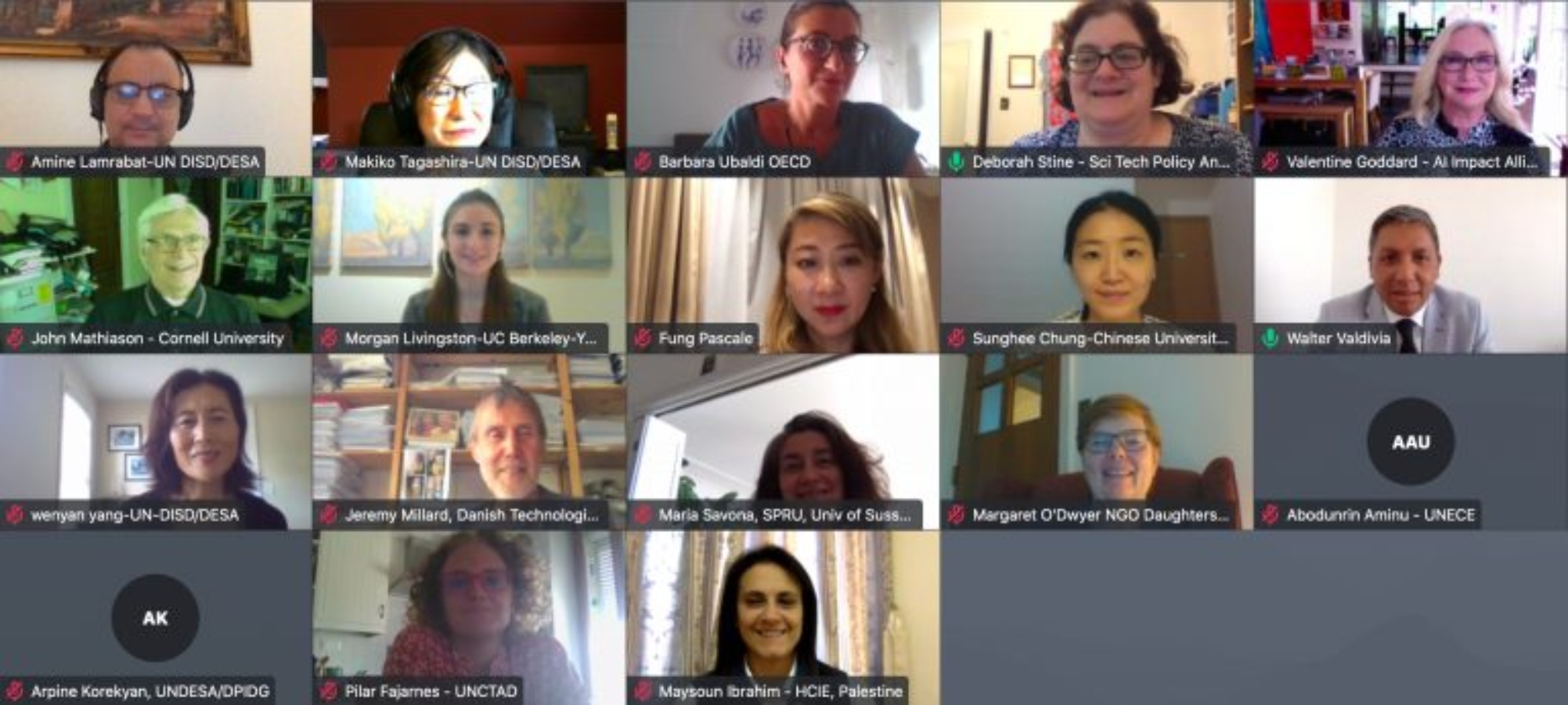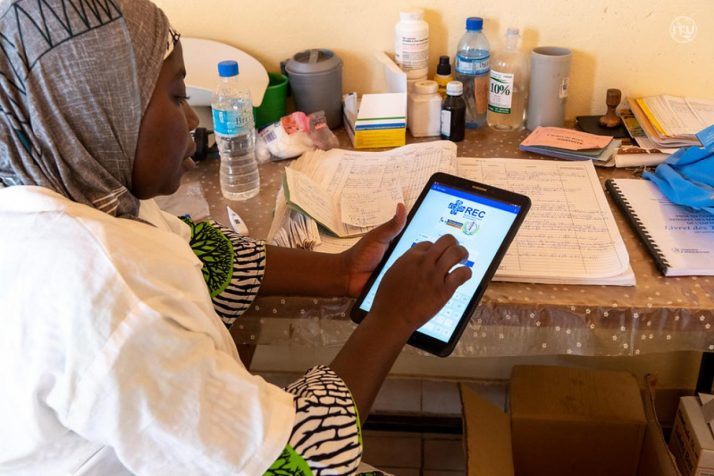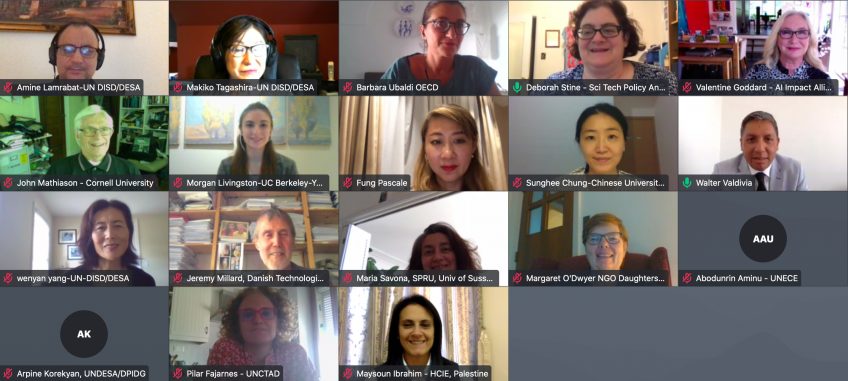
In this context, the expert group meeting was organized virtually from 4 to 7 August 2020, by the Division for Inclusive Social Development of the United Nations Department of Economic and Social Development (UNDESA), in collaboration with the United Nations Conference on Trade and Development (UNCTAD) and the International Telecommunication Union (ITU), with the cooperation with the United Nations Regional Commissions. Over 80 experts with diverse backgrounds from the five United Nations geographic regions participated in the virtual Expert Group meeting, to review and formulate concrete recommendations on what it takes to enable a socially just transition towards sustainable development and examine the role of digital technologies in facilitating a transition that is inclusive and more equitable.
Socially just transition towards sustainable development: The role of digital technologies on social development and well-being of all”

By adopting the 2030 Agenda for Sustainable Development, Member States committed to achieving sustainable development for all nations and peoples and for all segments of society. The Agenda is based on the ideals of inclusiveness and shared prosperity and Member States pledged to leave no one behind and to endeavor to reach the furthest behind first. With 10 years remaining to achieve the 2030 Agenda, addressing the inter-linkages between social, economic and environmental dimensions of sustainable development will require pursuing a socially just transition that is people-centered and grounded in the principles of social justice.
The economic and social fallouts of the COVID-19 pandemic are having a dramatic impact on social development and well-being worldwide. The crisis risks reversing decades of progress in the fight against poverty and exacerbating already high levels of inequality. At the same time, the COVID-19 crisis provides the opportunity to rethink existing socio-economic policy frameworks in order to ‘rebuild better’. It has sparked a global dialogue on ways forward out of the crisis to build more inclusive and equitable societies by aligning policy frameworks with the vision and overarching objectives of the 2030 Agenda.
In this context, the expert group meeting was organized virtually from 4 to 7 August 2020, by the Division for Inclusive Social Development of the United Nations Department of Economic and Social Development (UNDESA), in collaboration with the United Nations Conference on Trade and Development (UNCTAD) and the International Telecommunication Union (ITU), with the cooperation with the United Nations Regional Commissions.
Over 80 experts with diverse backgrounds from the five United Nations geographic regions participated in the virtual Expert Group meeting, to review and formulate concrete recommendations on what it takes to enable a socially just transition towards sustainable development and examine the role of digital technologies in facilitating a transition that is inclusive and more equitable. The following is the outcome of the meeting, which will provide substantive input to the Secretary-General’s report on the priority theme of the Commission for Social Development to be held in February 2021, and is expected to assist Member States in implementing various SDGs, including Goals 1, 2, 3, 4, 5, 7, 8, 9, 10, 11, 12, 13, and 16.

Report of the Expert Group Meeting

Video message from Mr. Fabrizio Hochschild-Drummond, Under-Secretary-General and Special Adviser on the Preparations for the Commemoration of the United Nations’ 75th Anniversary and the High-Level Panel on Digital Cooperation.
Papers
- Impacts of COVID-19 on social development and implications for the just transition to sustainable development by Jeremy Millard
- Closing the Digital Divide: The Role of Digital Technologies on Social Development, Well-Being of All and the Approach of the Covid-19 Pandemic by Jan A.G.M. van Dijk
- Implementing the 2030 Agenda for Sustainable Development in Palestine:An Innovation-Centric Economic Growth Perspective by Maysoun Ibrahim
- What can we learn from the original spirit and spread of the Internet, for the building of capacity and e-learning in knowledge societies that can foster the achievement of the UN Sustainable Development Goals by 2030? by Mei Lin Fung
- Addressing inequality: in the context of Sustainable Development Goals “How greater equality aids the transition to sustainability” by Richard Wilkinson
- Socially just transition and the role of digital technologies on social development and well-being of all: regional perspectives by Bakr Zade
Presentations
- The Digital Divide and the Covid-19 Pandemic by Jan van Dijk
- Digital Inclusion by J. Alison Bryant
- Step Up to Seize Your Power by Mei Lin Fung
- Socially Just Transitions by Ekkehard Ernst
- Digital Inclusion: Addressing the Specific Needs of Vulnerable Groups by Ifeyinwa Ofong
- Closing the Digital Divide by Onyukwu E. Onyukwu
- Socially Just Transition Towards SD by Onyukwu E. Onyukwu
- Socially just transition towards sustainable development: The role of digital technologies on social development and well-being of all by Monica Duhem
- Socially just transition towards sustainable development: The political economy of large wealth inequality by Alexandre Kolev
- Digital Inclusion: addressing the specific needs of vulnerable groups by Jaco du Toit
- The UN ECE Region Perspective by Eglė STANIŠKIENĖ
- Impacts of COVID-19 on social development and implications for the just transition to sustainable development by Jeremy Millard
- The role of digital technologies on social development and well-being of all by Monica Duhem
- Steering Research and Innovation for the Global Goals Direction, Forecasting and Inclusion by Tommaso Ciarli
- EC HLG report The impact of the Digital Transformation on EU Labour Markets by Maria Savona
- Use Technology-Enabled SDG-Based Sustainable Public Procurement (SPP)to Engage the Private Sector in Contributing to the SDGs by Bob Willard
- Recommendations for a socially just transition towards sustainable development:how to ensure AI is a tool for social development and well-being of all by Valentine Goddard
- Digital Governance and a Socially Just Transition toward Sustainable Development: A Proposal for an International SDG Science, Technology, and Innovation (STI) Policy Fellowship Program by Deborah D. Stine
- Closing the Digital Divide by Mariagrazia Squicciarini
- Governing the Digital Transformation by Barbara-Chiara Ubaldi
Resources
- SDG-Based Sustainable Public Procurement
- UNCTAD Digital Economy Report 2019: Value Creation and Capture: Implications for Developing Countries
- 2020 Child Online Protection (COP) Guidelines by ITU
- Digital Skills Assessment Guidebook (2020) by ITU
- Toolkit and Global Standard for safe listening devices and systems (2019) by ITU
- Digital Skills Toolkit (2018) by ITU
- Access to telecommunication/ICT services by persons with disabilities and with specific needs (2017) by ITU
- Coding Bootcamps: a Strategy for Youth Employment (2016) by ITU
- Digital Opportunities: Innovative ICT Solutions for Youth Employment (2014) by ITU
- Model ICT Accessibility Policy Report (2014) by ITU
- The ICT Opportunity for a Disability-Inclusive Development Framework (2013) by ITU
- Universal Service Funds and Digital Inclusion for All (2013) by ITU
- A Bright Future in ICTs Opportunities for a new generation of women (2012) by ITU
- Making Mobile Phones and Services Accessible for Persons with Disabilities (2012) by ITU
- Making Television Accessible (2011) by ITU
- BRIDGING THE DIGITAL GENDER DIVIDE INCLUDE, UPSKILL, INNOVATE by OECD
- BRIDGING THE DIGITAL GENDER DIVIDE INCLUDE, UPSKILL, INNOVATE – Key messages by OECD
- THE ROLE OF EDUCATION AND SKILLS IN BRIDGING THE DIGITAL GENDER DIVIDE – EVIDENCE FROM APEC ECONOMIES by OECD
- Narrowing the gender wage gap in the digital era: the role of skills by OECD
- Skills and Gender in the Digital Transformation by OECD
- Women at the core of the fight against COVID-19 crisis by OECD
- Submission by the Alliance for Affordable Internet (A4AI)
- Covid-19 Policy Brief: Internet Access & Affordability by A4AI
- Meaningful Connectivity Standard by A4AI
- Rural Broadband Policy Framework by A4AI
- UNSDG Guidance Note on Data Privacy, Ethics and Data Protection
- Risks, Harms and Benefits Assessment and Guide
- White Paper on Building Ethics into Privacy Frameworks
- UN Principles on Personal Data Protection and Privacy
- The Wellbeing Economy Alliance
- The Equality Trust
- Innovation, Structural Change, and Inclusion. A Cross Country PVAR Analysis
- The relation between research priorities and societal demands: The case of rice
- Mapping research and innovation for sustainability: enhancing rigour and accountability in the global politics of science and technology
- Varieties of European National Innovation Systems
- Innovation for Inclusive Structural Change
- Final report of the High-Level Expert Group on the Impact of the Digital Transformation on EU Labour Markets
- Millard, J (2015) “The digital divide and the post-2015 development debate” in Digital Divides: The New Challenges and Opportunities of e-Inclusion, Taylor and Francis Publishing Group, Abingdon, UK.
- Millard, J (2017) “Summary report on social innovation for poverty reduction and sustainable development”, deliverable of the EU H2020 funded project “Social Innovation: Driving Force of Social Change”
- The fourth Industrial Revolution Combating COVID 19: The Role of Smart and Sustainable Cities by Maysoun Ibrahim
 Welcome to the United Nations
Welcome to the United Nations